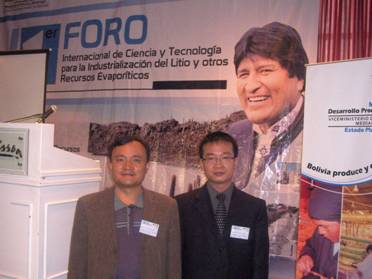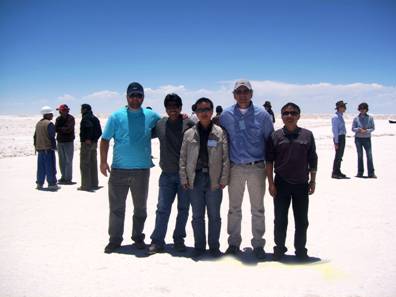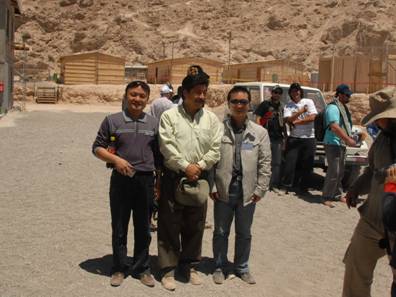 The 1st International Forum on Science and Technology for the Industrialization of Lithium and Other Evaporative Resources, sponsored by Vice Ministry of Science and Technology of Bolivian Ministry of Planning and Development (OGI-Bolivia), and some other Bolivian organizations, was held from October 29th to November 1st, at La Paz and the Uyuni Salt Flat, Bolivia. Upon invitation by OGI-Bolivia, ISL Research Associate Professor Xianming Wen and Dr Huaide Cheng attended this conference and gave a presentation of our institute, its endeavors in salt lake science and technology and our strategy on the development of the Uyuni resources.
The 1st International Forum on Science and Technology for the Industrialization of Lithium and Other Evaporative Resources, sponsored by Vice Ministry of Science and Technology of Bolivian Ministry of Planning and Development (OGI-Bolivia), and some other Bolivian organizations, was held from October 29th to November 1st, at La Paz and the Uyuni Salt Flat, Bolivia. Upon invitation by OGI-Bolivia, ISL Research Associate Professor Xianming Wen and Dr Huaide Cheng attended this conference and gave a presentation of our institute, its endeavors in salt lake science and technology and our strategy on the development of the Uyuni resources.
 Covering an area of approximately 10,000 km2, the Salar de Uyuni is the largest salt lake in the world. Holding a lithium reserve estimated at 26.4 million ton lithium carbonate equivalent exceeding the well known Salar de Atacama, the salt flat reports 40% of the world's salt lake lithium resources, hence ranked as the most promising lithium deposit to be exploited in an age greener energy sources are to be massively employed to alleviate the ever increasing energy crises associated with the depletion of conventional energy sources of petroleum, natural gas, etc, and strengthen environmental protection.
Covering an area of approximately 10,000 km2, the Salar de Uyuni is the largest salt lake in the world. Holding a lithium reserve estimated at 26.4 million ton lithium carbonate equivalent exceeding the well known Salar de Atacama, the salt flat reports 40% of the world's salt lake lithium resources, hence ranked as the most promising lithium deposit to be exploited in an age greener energy sources are to be massively employed to alleviate the ever increasing energy crises associated with the depletion of conventional energy sources of petroleum, natural gas, etc, and strengthen environmental protection.
The Bolivian government plans to speed up the development its salt lake resources and build up its own salt lake industry by introducing foreign advanced technologies for the production of salt lake crude materials such as potassium fertilizers and lithium salts and high value lithium battery materials. Consequently, the 1st Forum of this lithium conference was scheduled and held at La Paz and Uyuni in late October 2009. Meanwhile, driven by the positive outlook of lithium market to multiply in a medium term with the successive resolution of the technical issues in the production of lithium batteries for EVs, HEVs and PHEVs, a number of countries are seeking to acquire mining rights at the Salar. The conference attracted around 100 scientists, technicians, entrepreneurs and government officials from France, Japan, China, South Korea, Canada, Australia, and other South American countries, competing for the participation in the development of the Uyuni resources while sharing their knowledge in an academic fashion.
with the successive resolution of the technical issues in the production of lithium batteries for EVs, HEVs and PHEVs, a number of countries are seeking to acquire mining rights at the Salar. The conference attracted around 100 scientists, technicians, entrepreneurs and government officials from France, Japan, China, South Korea, Canada, Australia, and other South American countries, competing for the participation in the development of the Uyuni resources while sharing their knowledge in an academic fashion.
The Forum started on the morning of October 29th, with an opening speech addressed by the Bolivian President Evo Morales, stressing their policy on the development of the Uyuni salt lake resources and the importance of living in harmony with Mother Nature, which were further elaborated by subsequent speeches presented by a couple of Bolivian ministers. Dr Wen delivered the ISL presentation broadly in cooperation with Dr Cheng, focusing on the history of the institute, its structure of disciplines, research systems, and endeavors in the exploration and exploitation of salt lake resources and development value-added materials, with its achievements and notable studies particularly exemplified. The presentation also put forward ISL's comprehensive generalized approach and strategy in the exploitation of the Uyuni salt lake resources, with a conceptual process route recommended to the audience. It is expressed that ISL welcomes cooperation from companies, universities and research institutes in the development of Bolivian salt lake resources. The speech interested many attendees from Canada, France, Japan, Chile, as well as the Bolivian  government officials. After the conference, the organizers arranged the representatives for a site visit to a lithium carbonate pilot plant at the Salar.
government officials. After the conference, the organizers arranged the representatives for a site visit to a lithium carbonate pilot plant at the Salar.
ISL has gained international prominence through decades of persistent endeavors in the fields of salt lakes. The Bolivian conference has offered a brilliant arena for the institute to boost its recent move in collaborative international projects. ISL's attendance in this event has attracted attention from salt lake communities all over the world, hence made an important step in its striving to be a pioneer in this research industry, while maintaining its mission of meeting national strategic demands.